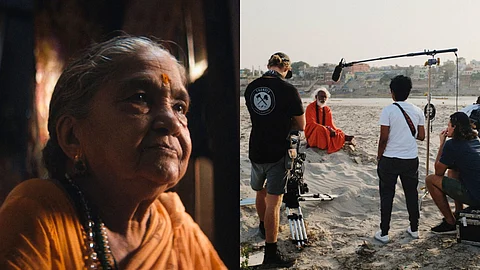
- HOMEGROWN WORLD
- #HGCREATORS
- #HGEXPLORE
- #HGVOICES
- #HGSHOP
- CAREERS
- ABOUT US
- CONTACT US

There are films that document, and then there are films that illuminate. 'By The River', directed by Dan Braga Ulvestad, falls into the latter category. An exploration of the 'death hotels' of Varanasi, it's a haunting, poetic journey into the heart of human faith, mortality, and the eternal search for meaning. This is a film that invites us to sit in the silence of waiting, to peer into the flickering light of a funeral pyre, and to reckon with the uncomfortable truth that death is not an ending but a continuation of something far older than any of us.
The city of Varanasi is better described as a state of being. The river Ganga snakes through it like an ancient deity, receiving the bodies of the departed and carrying them toward salvation. Hindu tradition teaches that dying here ensures moksha, liberation from the endless cycle of rebirth. In By The River, Ulvestad's camera lingers on the faces of those who have come to this sacred place to die. It captures the weight of their patience and the quiet dignity of their faith.
Through intimate portraits, the documentary moves beyond simple exposition, treating its subjects as individuals making a deeply personal choice. Some have been waiting for decades, their days unfolding in the slow rhythm of prayers, rituals, and the ebb and flow of the river itself. They aren't tragic figures, nor are they zealots. They are simply people who believe.
Visually, By The River is a marvel. Cinematographer Caleb Ware crafts a palette that is equal parts ethereal and earthy. The film’s use of anamorphic lenses lends Varanasi an almost mythical aura. The hazy glow of funeral pyres against the midnight sky, the reflections of light rippling on the water — every frame is composed with an eye for detail. The film does not hurry. It drifts. Long, unbroken takes give the audience time to absorb the weight of each moment.
One of the most profound aspects of By The River is how it forces Western audiences to reconsider their relationship with death. In many parts of the world, death is shrouded in euphemism and avoidance, a thing to be feared and hidden. But in Varanasi, it is neither morbid nor grotesque—it is simply a fact of life. Ulvestad does not exoticize or sensationalize this perspective; rather, he allows the city and its people to speak for themselves.
Perhaps the most striking contrast comes in the form of the children who grow up along the Ganges, entirely accustomed to the rituals of cremation and farewell. To them, death is not a terrifying unknown but a daily reality, woven into the very fabric of existence. The film allows these young voices to emerge, offering a perspective that is at once unsettling and profoundly logical.
Filming in Varanasi presented its own set of ethical dilemmas. How do you document something so intimate without intruding? Ulvestad and his team navigate this challenge with grace, treating their subjects with respect. There's no exploitative framing or forced narrative. The film earns its moments, allowing them to unfold naturally.
In one of its most striking sequences, the Ganga Aarti ceremony plays out in all its sensory grandeur — a symphony of light, sound, and devotion. Here, By The River becomes a meditation on what it means to seek meaning in the face of the inevitable.
Great documentaries change the way we see the world. By The River does exactly that. It doesn't provides easy answers, nor does it attempt to force a singular interpretation of its subjects’ beliefs. Instead, it asks us to consider, if only for a moment, what it means to embrace the unknown.
Like the river itself, this film carries us along on a journey that is both deeply personal and universally resonant. In the end, we're left not with fear, but with something closer to peace.
Watch By The River here.
